Congrats, Hugo! 🎉
01.10.2025 21:30 — 👍 1 🔁 0 💬 1 📌 0Thomas Tichelbaecker
@ttichelbaecker.bsky.social
PhD Candidate @Princeton Politics, researcher @TU Chemnitz - Political parties and polarization. tichelbaecker.com
@ttichelbaecker.bsky.social
PhD Candidate @Princeton Politics, researcher @TU Chemnitz - Political parties and polarization. tichelbaecker.com
Congrats, Hugo! 🎉
01.10.2025 21:30 — 👍 1 🔁 0 💬 1 📌 0
Glad to see this out at @ajpseditor.bsky.social! I show that the immigration-crime issue, when salient, can shift leftist cosmopolitans to the Right. This is due to leftist voters being more conservative on crime than leftist parties.
onlinelibrary.wiley.com/doi/10.1111/...
Congrats Julius! :)
14.06.2025 19:49 — 👍 1 🔁 0 💬 1 📌 0
Thinking about immigration from a cultural perspective heightens distrust of political opponents—with Adams, @rwillh11.bsky.social and @ttichelbaecker.bsky.social at @bjpols.bsky.social. Might interest scholars of polarization and ideology, and those analyzing open-ended questions. cup.org/3ZajcQ1
02.06.2025 21:46 — 👍 67 🔁 17 💬 1 📌 0Another great paper by @ttichelbaecker.bsky.social of now also TU Chemnitz. Congrats, Thomas!
30.05.2025 11:28 — 👍 9 🔁 2 💬 0 📌 0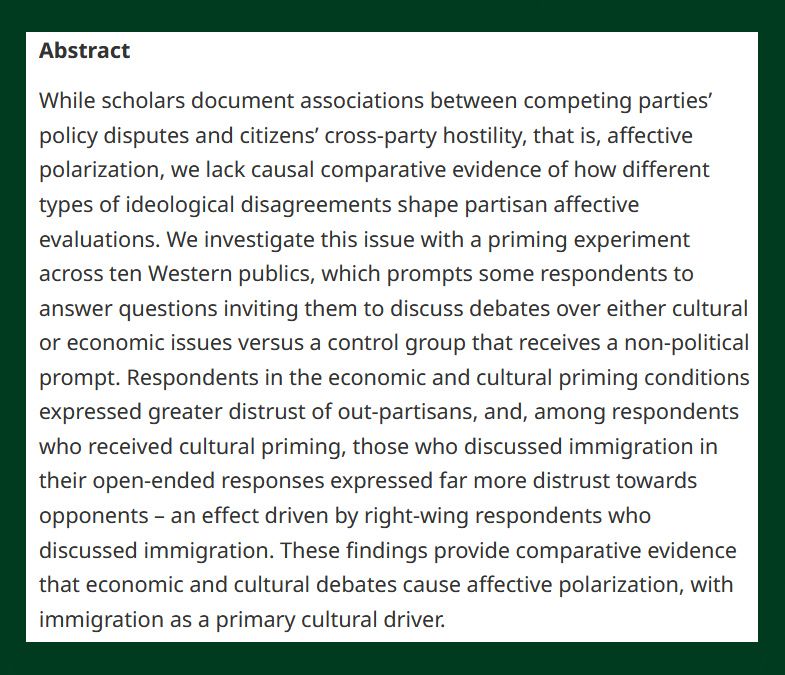
BJPolS abstract discussing scholars' investigation into polarization and logical comparisons across party entities, cultural priming in economic discussions, and the effect of cultural debates on political discourse.
NEW -
Beyond Observational Relationships: Evidence from a Ten-Country Experiment that Policy Disputes Cause Affective Polarization - cup.org/3Zvgchx
- @noamgidron.bsky.social, James Adams, @rwillh11.bsky.social & @ttichelbaecker.bsky.social
#OpenAccess
Important research by @annekreft.bsky.social reveals the scale and impact of political violence in Germany. Drawing on a survey of over 1,400 politicians, the study shows that 1 in 5 politicians reduces their political activity as a result.
02.06.2025 09:40 — 👍 1 🔁 1 💬 0 📌 0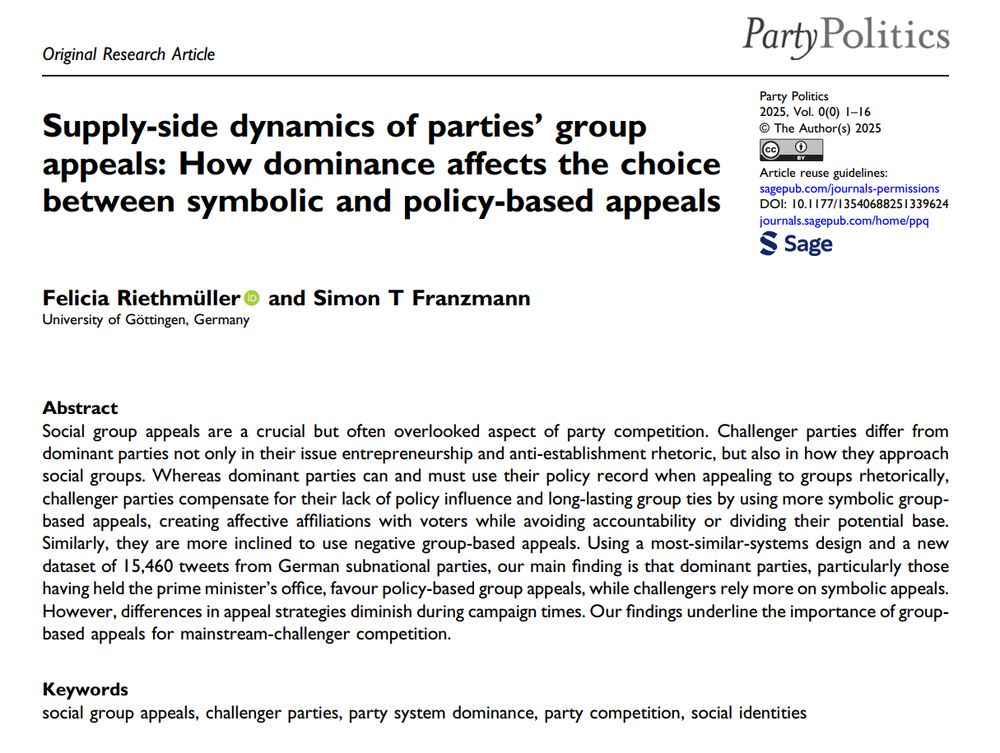
Abstract Social group appeals are a crucial but often overlooked aspect of party competition. Challenger parties differ from dominant parties not only in their issue entrepreneurship and anti-establishment rhetoric, but also in how they approach social groups. Whereas dominant parties can and must use their policy record when appealing to groups rhetorically, challenger parties compensate for their lack of policy influence and long-lasting group ties by using more symbolic groupbased appeals, creating affective affiliations with voters while avoiding accountability or dividing their potential base. Similarly, they are more inclined to use negative group-based appeals. Using a most-similar-systems design and a new dataset of 15,460 tweets from German subnational parties, our main finding is that dominant parties, particularly those having held the prime minister’s office, favour policy-based group appeals, while challengers rely more on symbolic appeals. However, differences in appeal strategies diminish during campaign times. Our findings underline the importance of groupbased appeals for mainstream-challenger competition.
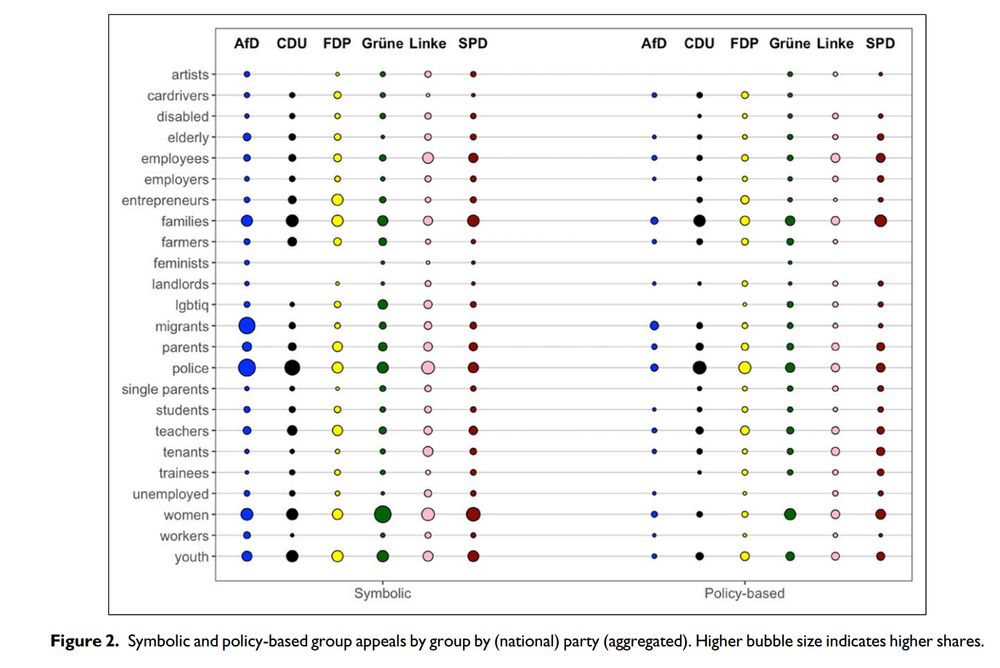
Thrilled to see my 1st PhD paper out in #PartyPolitics! Based on ~15000 posts by 86 German subnat. parties (2015-2019), Simon Franzmann & I show that dominant & challenger parties differ in the use of policy-based vs symbolic & positive vs negative appeals.
🔓:
doi.org/10.1177/1354...
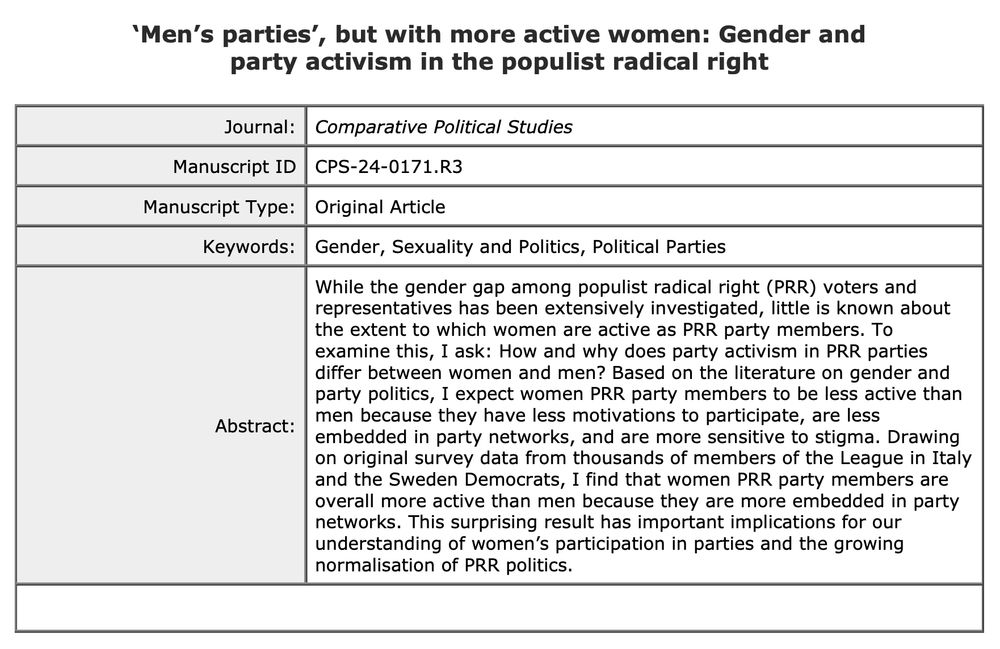
Thrilled that my article on women's activism in PRR parties has been conditionally accepted in @cpsjournal.bsky.social!
Drawing on membership surveys of the League 🇮🇹 and the Sweden Democrats 🇸🇪, I show that women members are *more active* than men because they are more embedded in party networks.
Thanks so much Sofia and thank you again for your feedback! 😊
10.05.2025 05:17 — 👍 1 🔁 0 💬 0 📌 0Thanks so much for sharing our work! 😊 I fully agree with the narrator voice!
08.05.2025 13:03 — 👍 0 🔁 0 💬 0 📌 0
Another great publication by @ttichelbaecker.bsky.social and his first with TU Chemnitz affiliation: "Does political violence undermine descriptive representation? The case of women in politics" out in EJPR. #openaccess Thanks for helping us put Chemnitz on the map, Thomas! doi.org/10.1111/1475...
29.04.2025 17:21 — 👍 14 🔁 2 💬 0 📌 0@riazsascha.bsky.social,
@antvalentim.bsky.social
We are grateful to many people for their generous feedback @ammassarisofia.bsky.social , @rdancygier.bsky.social, @hannohilbig.bsky.social, @homola.bsky.social, Anne-Kathrin Kreft, @pmkuhn.bsky.social, Tali Mendelberg, @simonotjes.bsky.social, @tinepaulsen.bsky.social, @neerajprsd.bsky.social
08.05.2025 12:56 — 👍 4 🔁 0 💬 1 📌 0As highlighted by @sandrahkansson.bsky.social, Sofia Collignon, and @gemmadipoppa.bsky.social, this challenge adds to the broader problem that political violence more frequently targets women in public office.
08.05.2025 12:56 — 👍 1 🔁 0 💬 1 📌 0Our findings contribute to research on political violence and gender by suggesting that such exposure may hinder efforts to close the gender gap long-term by deterring women early in the political pipeline from pursuing public office.
08.05.2025 12:56 — 👍 0 🔁 0 💬 1 📌 0
Re-running our survey experiment in a representative survey, we find suggestive evidence that there is some heterogeneity among women. Women with lower political interest are less likely to indicate that they are willing to become active in politics (WTE)
08.05.2025 12:56 — 👍 1 🔁 0 💬 1 📌 0
Using observational data and a survey experiment in Germany, we find that exposure to political violence does not produce gender-differentiated effects among politically interested individuals. If anything, the treatment suggests that men become less willing to engage in politics (WTE)
08.05.2025 12:56 — 👍 4 🔁 1 💬 1 📌 0Happy to share a new paper now out in EJPR w/ @jeyalizade.bsky.social , @fabioellger.bsky.social and @mgruenewald.bsky.social exploring gendered effects of political violence on political supply.
https://ejpr.onlinelibrary.wiley.com/doi/full/10.1111/1475-6765.70017
A 🧵 with findings

New 📰: In "Can Individual MPs Damage Their Party’s Brand? Quasi-Experimental Evidence from a Public
Procurement Corruption Scandal" out in @thejop.bsky.social @lukrudolph.bsky.social and I show that the "mask affair" cost the CDU 4%-points in elections. www.journals.uchicago.edu/doi/10.1086/... 1/

🚨 Just published in American Political Science Review 🚨
with Durgesh Pathak @sarahthompson.bsky.social and Aliz Toth
We show that strategic messaging by party leaders can effectively shape volunteer rank&file recruitment with consequences for long-term party development

We’re excited to introduce the Swedish Municipal Council Database! This open-access resource contains our hand-coded data for all local politicians in Sweden's democratic local elections between 1919 and 2018. A 🧵
Co-authors 🤩 @abrarbawati.bsky.social, @josefinemagnusson.bsky.social Moa Frödin

New preprint available! In this paper, @antvalentim.bsky.social and I investigate why progressive parties, such as the greens, might be more attractive for immigrants from established democracies than those from (post-)authoritarian regimes:
osf.io/preprints/os...
🧵⬇️
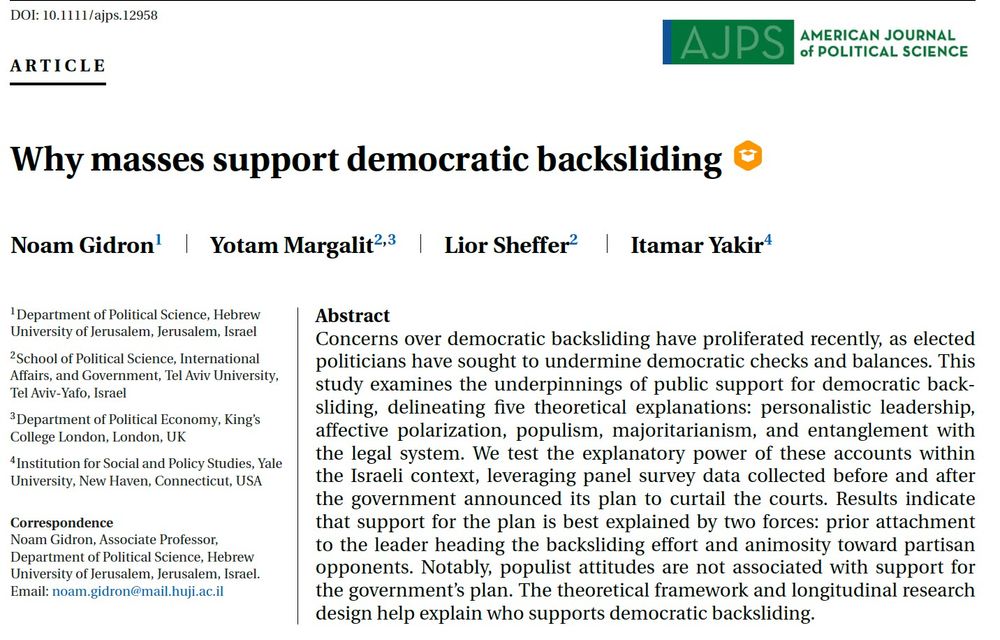
🚨Why do masses support democratic backsliding?🚨
A new @AJPS_Editor paper with Yotam Margalit, @liorsheffer.bsky.social and Itamar Yakir explores this question in the Israeli context. Our findings emphasize the role of leader attachment and affective polarization.
doi.org/10.1111/ajps...
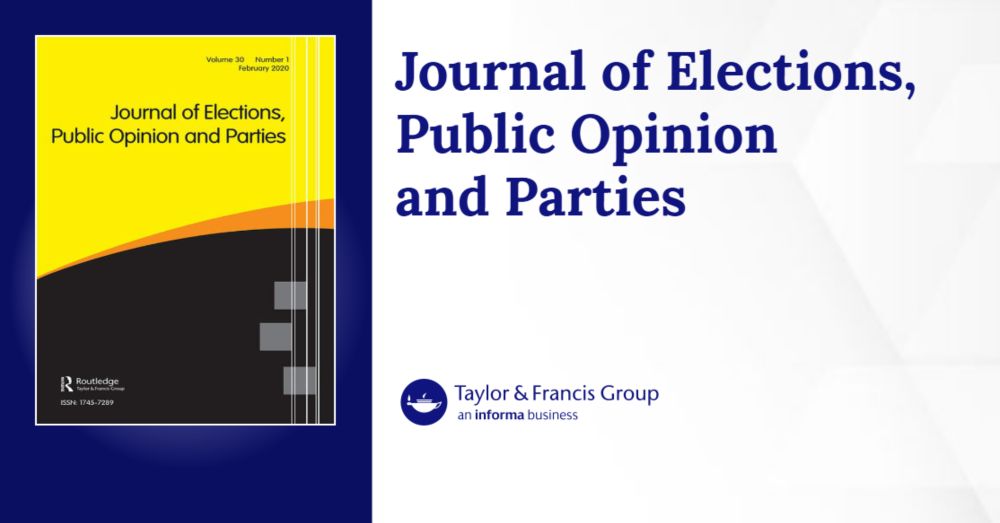
🚨🎉Very excited to share our new paper with @rwillh11.bsky.social, James Adams, @simonweschle.bsky.social, and @cbwlezien.bsky.social!! Out today @JEPOP
www.tandfonline.com/doi/full/10....
A short thread 🧵
1/n
Ich hab die gesammelt! Hab mal eine DM geschrieben.
11.02.2025 10:39 — 👍 0 🔁 0 💬 0 📌 0Danke dir, Eylem! :)
21.01.2025 10:43 — 👍 0 🔁 0 💬 0 📌 0Excited to share that I’ve joined the team led by @aleininger.bsky.social at TU Chemnitz as research fellow. I’m looking forward to exploring the legacies of democratic transitions and to connecting with my new colleagues in Chemnitz!
21.01.2025 09:53 — 👍 32 🔁 0 💬 1 📌 1
Maps of municipality-level election results
My fantastic co-author Julian Voss has meticulously compiled municipality-level election results for Post-WW2 Western German elections (1949-1969) from historical records. What a great resource! Read the paper, use the data: osf.io/preprints/os...
11.01.2025 13:02 — 👍 114 🔁 32 💬 3 📌 2